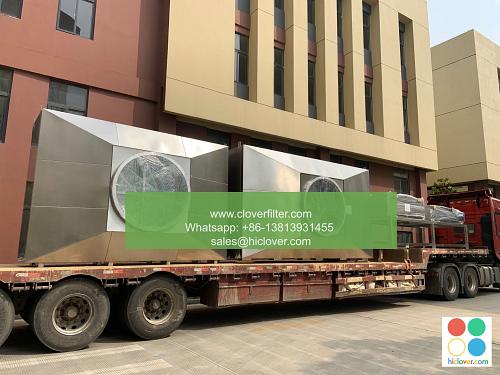Optimizing Air Quality and Efficiency in Canada’s Electronics Industry with Automatic Roll Air Filters

The Canadian electronics industry is a significant contributor to the country’s economy, with a wide range of products being manufactured and assembled across the country. However, the industry also poses some unique challenges, particularly when it comes to air quality and efficiency. The use of automatic roll air filters is one solution that can help optimize air quality and efficiency in Canada’s electronics industry.
Electronics manufacturing facilities often generate a significant amount of airborne contaminants, including particles, gases, and vapors. These contaminants can come from a variety of sources, including the manufacturing process itself, as well as from the materials and chemicals used in the production process. If not properly controlled, these contaminants can pose a risk to the health and safety of workers, as well as to the quality and reliability of the products being manufactured.
Automatic roll air filters are designed to provide a high level of air filtration, removing airborne contaminants from the air and helping to maintain a clean and safe working environment. These filters use a rolling mechanism to advance the filter media, which allows for a continuous supply of clean air and eliminates the need for manual filter changes. This not only helps to improve air quality but also increases efficiency, as workers do not need to spend time changing filters or maintaining the air filtration system.
In addition to improving air quality and efficiency, automatic roll air filters can also help to reduce costs and minimize waste. By removing airborne contaminants from the air, these filters can help to prevent damage to sensitive electronics and reduce the need for repairs and replacements. This can result in significant cost savings, as well as a reduction in the amount of waste generated by the manufacturing process.
Another benefit of automatic roll air filters is their ability to be customized to meet the specific needs of a particular facility or application. These filters can be designed to capture a wide range of airborne contaminants, including particles, gases, and vapors, and can be configured to meet the specific requirements of a particular manufacturing process. This allows facilities to tailor their air filtration system to their specific needs, rather than having to rely on a one-size-fits-all solution.
In Canada, there are a number of regulations and standards that govern the use of air filtration systems in electronics manufacturing facilities. For example, the Canadian Standards Association (CSA) has established standards for the design and installation of air filtration systems, including those used in electronics manufacturing. Additionally, Health Canada has established guidelines for the control of airborne contaminants in the workplace, which include recommendations for the use of air filtration systems.
Overall, the use of automatic roll air filters is an effective way to optimize air quality and efficiency in Canada’s electronics industry. By providing a high level of air filtration, reducing costs and waste, and allowing for customization to meet specific needs, these filters can help facilities to maintain a clean and safe working environment, while also improving the quality and reliability of their products.
In order to implement automatic roll air filters in an electronics manufacturing facility, a number of steps can be taken. First, a thorough assessment of the facility’s air quality needs should be conducted, including an analysis of the types and amounts of airborne contaminants present. Next, a suitable automatic roll air filter should be selected, based on factors such as the type and size of the facility, as well as the specific requirements of the manufacturing process. Finally, the filter should be installed and maintained properly, in accordance with the manufacturer’s instructions and relevant regulations and standards.
By following these steps and implementing an automatic roll air filter, electronics manufacturing facilities in Canada can help to optimize air quality and efficiency, while also reducing costs and minimizing waste.
Conclusion
In conclusion, the use of automatic roll air filters is an effective way to optimize air quality and efficiency in Canada’s electronics industry. By providing a high level of air filtration, reducing costs and waste, and allowing for customization to meet specific needs, these filters can help facilities to maintain a clean and safe working environment, while also improving the quality and reliability of their products. As the electronics industry continues to evolve and grow, the use of automatic roll air filters is likely to become increasingly important, as facilities seek to improve their air quality and efficiency, while also reducing their environmental impact.
FAQs
Q: What are the benefits of using automatic roll air filters in electronics manufacturing facilities?
A: The benefits of using automatic roll air filters include improved air quality, increased efficiency, reduced costs, and minimized waste.
Q: How do automatic roll air filters work?
A: Automatic roll air filters use a rolling mechanism to advance the filter media, which allows for a continuous supply of clean air and eliminates the need for manual filter changes.
Q: Can automatic roll air filters be customized to meet the specific needs of a particular facility or application?
A: Yes, automatic roll air filters can be customized to capture a wide range of airborne contaminants, including particles, gases, and vapors, and can be configured to meet the specific requirements of a particular manufacturing process.
Q: Are there any regulations or standards that govern the use of air filtration systems in electronics manufacturing facilities in Canada?
A: Yes, there are a number of regulations and standards that govern the use of air filtration systems in electronics manufacturing facilities in Canada, including those established by the Canadian Standards Association (CSA) and Health Canada.


